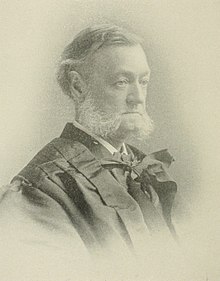Lucas v. United States
| Lucas v. United States | |
|---|---|
 | |
| Argued November 19, 1895 Decided May 25, 1896 | |
| Full case name | Lucas v. United States |
| Docket no. | 692 |
| Citations | 163 U.S. 612 (more) 16 S. Ct. 1168; 41 L. Ed. 282 |
| Case history | |
| Prior | United States v. Lucas, (C.C.W.D. Ark.) |
| Holding | |
| Whether a Negro Freeman who was murdered was a member of the Choctaw Tribe is a question of fact for the jury, and his non-Indian status may not be presumed. | |
| Court membership | |
| |
| Case opinion | |
| Majority | Shiras |
| Peckham took no part in the consideration or decision of the case. | |
| Laws applied | |
| 14 Stat. 769; 23 Stat. 362; 25 Stat. 786; 26 Stat. 81 | |
Lucas v. United States, 163 U.S. 612 (1896), was a United States Supreme Court case in which the Court held that whether a Black Freedman was a member of the Choctaw Nation was a question of fact for the jury, and his non-Indian status may not be presumed.
Background
[edit]
The Choctaw Nation was one of the Five Civilized Tribes in the Indian Territory (now the eastern part of Oklahoma),[a] and under their treaty with the United States, were allowed to have its own court system to try Indian on Indian crime.[2] When the crime was Choctaw on Choctaw, the tribal courts would handle the trial, but if it involved a non-tribal member, the case was handled by the federal court in Fort Smith, Arkansas.[3] Tribal members included Freedmen, African-Americans who had been slaves and who had been adopted by the tribe after the Civil War.[4]
In 1894, Eli Lucas,[b] a member of the Choctaw Nation, was indicted in the Circuit Court for the Western District of Arkansas for the murder of Levy Kemp, an African-American.[6][c] In 1895, Lucas was tried in Judge Isaac Parker's court, where witnesses said that Lucas had followed Kemp after a ball game and killed him.[8][d] The defense claimed that Lucas was not truthful when he had boasted that he had killed Kemp, but that some other, unknown person had committed the murder.[10] Lucas was convicted of murder, and sentenced to hang.[11]
Lucas's attorneys filed an appeal, and the Supreme Court agreed to hear the case.[12][e]
Supreme Court
[edit]
Justice George Shiras, Jr. delivered the opinion of the Court.[14] Although the Court agreed that Kemp was not a Choctaw Freedman and therefore not a member of the tribe, it held that Judge Parker had erred.[15] The trial court should not have presumed that Kemp was not a member of the tribe, the government should have been required to prove that element in order to establish jurisdiction.[16] Shiras noted that §§ 2145–2146, Revised Statutes,[17] stated that the federal courts did not have jurisdiction over Indian on Indian crime where the tribe had a tribal court.[18] He also held that allowing John LeFlore testify as to what Kemp had told him was hearsay and inadmissible.[19] The Court ordered that Lucas be retried, and reversed his conviction.[20] Lucas was then released to the Choctaw Nation for trial.[21]
Notes
[edit]- ^ The first constitution was adopted in 1826 and was modeled after the United States Constitution, providing for three branches of government. This included a court system.[1]
- ^ Lucas was also charged with larceny and had committed assault and battery.[5]
- ^ Kemp was described as "half-witted."[7]
- ^ The murder was particularly gruesome, Kemp was decapitated and his limbs severed from his body.[9]
- ^ Until 1889, Judge Parker heard the appeals of the cases he tried, as the Supreme Court did not hear appeals of capital cases.[13]
References
[edit]The citations in this article are written in Bluebook style. Please see the talk page for more information.
- ^ Devon Abbott Mihesuah, Choctaw Crime and Punishment, 1884-1907 15 (2012).
- ^ Treaty with the Choctaw and Chichasaw, Apr. 28, 1866, 14 Stat. 769; Lucas v. United States, 163 U.S. 612 (1896); 2 Indian Affairs: Laws and Treaties 918 (Charles J. Kappler ed., 1904).
- ^ Mihesuah, at 8.
- ^ Mihesuah, at 63; John Rockwell Snowden, Wayne Tyndall, & David Smith, American Indian Sovereignty and Naturalization: It's a Race Thing, 80 Neb. L. Rev. 171, 210 (2001).
- ^ Mihesuah, at 62.
- ^ Lucas, 163 U.S. at 612; Angie Debo, The Rise and Fall of the Choctaw Republic 192 (1975); Mihesuah, at 62.
- ^ S. W. Harman, Hell on the Border: He Hanged Eighty-eight Men 363 (1898).
- ^ Mihesuah, at 63.
- ^ Mihesuah, at 63.
- ^ Debo, at 192; Harman, at 364.
- ^ Lucas, 163 U.S. at 612; Debo, at 192; Mihesuah, at 63.
- ^ Mihesuah, at 63-64.
- ^ Jeffrey Brandon Morris, Establishing Justice in Middle America: A History of the United States Court of Appeals for the Eighth Circuit 37 (2007).
- ^ Mihesuah, at 64.
- ^ Mihesuah, at 64.
- ^ Mihesuah, at 64.
- ^ Act of Mar. 3, 1885, 23 Stat. 385 (codified as amended at 18 U.S.C. § 1153).
- ^ Mihesuah, at 64-65.
- ^ Mihesuah, at 64.
- ^ Harman, at 364; Mihesuah, at 66; Territory News, Phoenix (Muskogee, Okla.), Jun. 4, 1896, at 1 (via Newspapers.com
 ).
).
- ^ Reversals and Acquittals of Capital Crimes after 1890, National Park Service, n.d. (last visited Aug. 6, 2015).
External links
[edit]- Text of Lucas v. United States, 163 U.S. 612 (1896) is available from: Justia Library of Congress
